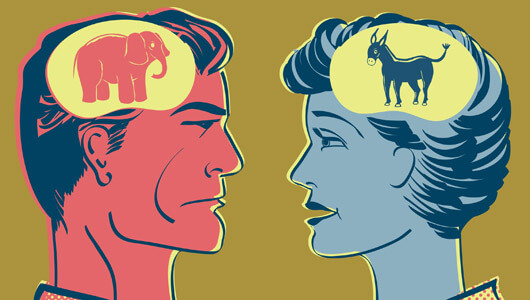A new study has entered the debate on whether our political beliefs are acquired through logic and reasoning, or if they are more emotionally driven. As it turns out, how people’s brains show disgust is a highly accurate indicator of whether they are liberal or conservative.
The study published in Current Biology tested subjects’ reactions to disturbing images, both subjectively – each person’s conscious rating of disgust – and objectively, using fMRI, a neuroimaging procedure that measures brain activity by detecting changes in blood flow. The findings were intriguing in just how polarized they were. Even a single image, the authors reported, was enough in many cases to determine the political leaning of a subject. The fact that the objective measure was a better indicator than subjective response seems to indicate that rational thinking is not as central to beliefs as we might think.
“People tend to think that their political views are purely cognitive. However, our results further support the notion that emotional processes are tightly coupled to complex and high-dimensional human belief systems, and such emotional processes might play a much larger role than we currently believe, possibly outside our awareness of its influence.”
How did they do the research? The Virginia Tech university led team tested 83 volunteers. They each looked at 80 different images – 20 each of disgusting, threatening, pleasant or neutral images. The researchers watched how the participants’ brains reacted to each of those images while in the machine. Later, they were asked to rate how disgusting, pleasant or threatening each image was. When shown a disgusting image, the brains of self-identifying conservatives’ brains reacted more strongly, and in different ways, compared with the liberals’ brains.
“Although our results suggest that disgusting pictures evoke very different emotional processing in conservatives and liberals,” the authors wrote, “it will take a range of targeted studies in the future to tease apart the separate contribution of each brain circuit.”
Although the study revealed strong correlations, what exact brain mechanisms are different between liberals and conservatives is not clear. It does reveal, however, that political differences may arise from subconscious, biological underpinnings. P. Read Montague of Virginia Tech, who lead the research, hopes that it will help people reconcile their political differences.
“In the same sense that height is highly genetically specified, it’s also true that it’s not predetermined by genetics; nutrition, sleep, starvation, dramatic physical injury, and so on can serve to change one’s ultimate height. However, tall people have tall children, and this is a kind of starting point. In the same vein, if we can begin to see that some ‘knee-jerk’ reactions to political issues may be simply that – reactions – then we might take the temperature down a bit in the current boiler of political discourse.”


